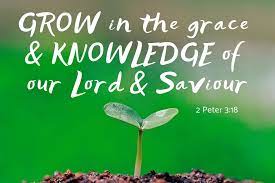Knowledge of God: Recap
Knowledge of God is critical. For believers, it establishes the moral authority and inspiration in our life, which results in purposeful living, and understanding what God has given to us. For non-believers, it can influence their decision to either accept or reject Jesus Christ’s offer of salvation.
Knowledge of God is not only to be intellectually informed, but to be experienced as our personal reality. With the coming of Christ, this experience is possible as a result of our faith response and acceptance of Jesus Christ as our Lord and Savior. (John 14:7; 17:3)
As believers, we are instructed to “grow in the knowledge of God” (2 Pet. 3:18). The driving force for knowing God is relationship. Relationship with God requires both commitment to Him and connection with Him. We abide in Him (Psa. 91:1), we dwell with Him (Psa. 27:4), and we thirst for Him (Psa. 42:1-2). We grow!
And in doing so, our minds are renewed, and we are transformed: changed into the image of Jesus (Rom. 8:29; 12:2). Our knowledge is continually expanded as more about God is revealed through the Holy Spirit. What we currently know is only a foretaste until we see Him “face-to-face” in eternity future (1 Cor. 13:9-10).
Knowledge of God or spiritual ignorance?
We’ve all heard that “knowledge is power,” often to the point where it seems like a cliche. The idea that “knowledge is power” is used often in the business world, especially in negotiations. Knowledge of God is also powerful. In 2 Peter 1:2-3, the apostle encourages Christians to persevere in persecution. Why? How?
Grace and peace be multiplied to you in the knowledge of God and of Jesus our Lord, as His divine power has given to us all things that pertain to life and godliness, through the knowledge of Him who called us by glory and virtue.
The Apostle Paul concurs with this thought in his letter to the saints in Ephesus who had power through their knowledge of God, yet they were living as beggars. They had relegated themselves to live in “spiritual poverty” amid God’s abundant grace including adoption, acceptance, redemption, forgiveness, wisdom, inheritance, the seal of the Holy Spirit, life, grace, and citizenship (Eph. 1:3-14).
As believers in Christ, are we exercising the power that has been given to us through our knowledge of God? Knowing “who we are” and “whose we are” gives us extraordinary advantage and power. Our relationship with God (as His children) and our position (in Christ) gives us access to unlimited resources to stand firm, immovable, always abounding in the Lord (1 Cor. 15:58).
Knowledge of God and power
Paul prays for “revelation” for the church; that they may see (and know) how to navigate the challenges they face as a new church in a pagan and hostile city.
That the God of our Lord Jesus Christ, the Father of glory, may give to you the spirit of wisdom and revelation in the knowledge of Him, the eyes of your understanding being enlightened; that you may know what is the hope of His calling, what are the riches of the glory of His inheritance in the saints, and what is the exceeding greatness of His power toward us who believe, according to the working of His mighty power. (Eph. 1:17-19)
Paul sets out to explain how the wisdom and knowledge of God can address the needs of the church. In this context, that knowledge is obtained as a result of accepting Jesus Christ’s offer of salvation.
“may give to you the spirit of wisdom and revelation in the knowledge of Him”
Some commentaries interpret spirit (pneuma) as a disposition or attitude one might possess. Of course, we cannot obtain such a disposition apart from the Holy Spirit. Wisdom gives insight into the true nature of things. Revelation is the unveiling of God Himself. The purpose of both wisdom and revelation is to know God better.
“the eyes of your understanding being enlightened”
Paul prayed that they might have true spiritual insight into God as a result of the eyes of their heart being enlightened. It is the heart where transformation begins. Paul testifies to the church at Corinth that “God who commanded the light to shine out of darkness, had shined in his heart to give the glory of the knowledge of the glory of God in the face of Jesus Christ” (2 Cor. 4:6).
That we might know
Having prayed that the Ephesians might know God personally, Paul gives the reason why knowledge of God is important. THAT WE MIGHT KNOW. Know in this context is factual knowledge.
The hope of His calling. This pertains to the believer’s present hope when he was called to faith (2 Tim. 1:9). This occurred for the believer in the past. Hope in Scripture is the absolute certainty of a believer’s victory in God (Col. 1:5).
The riches of the glory of His inheritance in the saints. “His” in this text pertains to God Himself. At the time of the resurrection of believers, God will inherit those whom He has purchased at a great price according to the riches of His grace. This will occur in the future. God’s inheritance will be the saints themselves.
The exceeding greatness of His power toward us who believe, according to the working of His mighty power. This power of God is directed toward believers. This pertains to the present time. Using three different words—power, working, and mighty—Paul underscores the magnitude of God’s great power available to Christians.
I close this series with this quote from Dr. Max Anders, pastor and noted author:
To know God and to find one’s full satisfaction in that knowledge is the ultimate goal of the Christian experience. The Lord’s greatest delight comes when His people discover the ultimate value lies in the knowledge of God. Nothing in the material world can complete the delights that are present in His Person.










